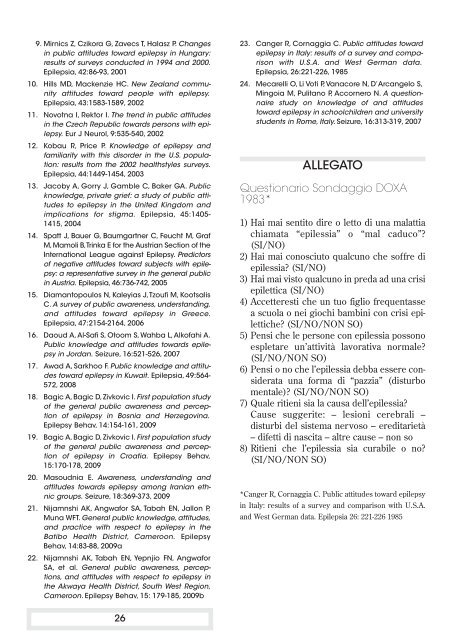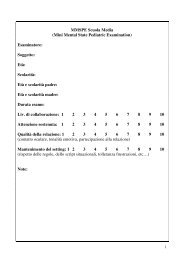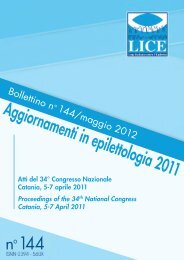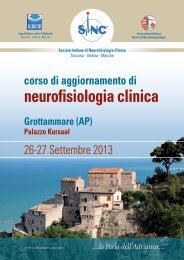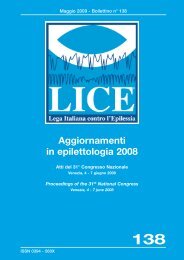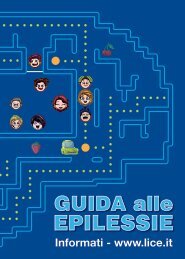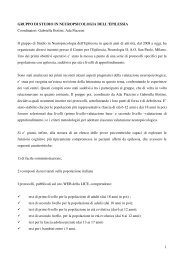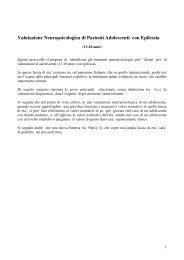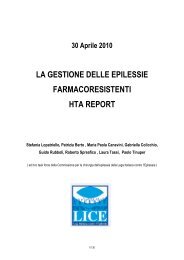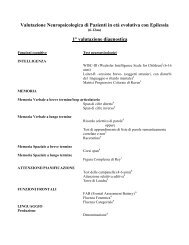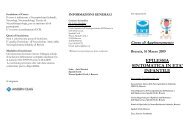Create successful ePaper yourself
Turn your PDF publications into a flip-book with our unique Google optimized e-Paper software.
9. Mirnics Z, Czikora G, Zavecs T, Halasz P. Changes<br />
in public attitudes toward epilepsy in Hungary:<br />
results of surveys conducted in 1994 and 2000.<br />
Epilepsia, 42:86-93, 2001<br />
10. Hills MD, Mackenzie HC. New Zealand community<br />
attitudes toward people with epilepsy.<br />
Epilepsia, 43:1583-1589, 2002<br />
11. Novotna I, Rektor I. The trend in public attitudes<br />
in the Czech Republic towards persons with epilepsy.<br />
Eur J Neurol, 9:535-540, 2002<br />
12. Kobau R, Price P. Knowledge of epilepsy and<br />
familiarity with this disorder in the U.S. population:<br />
results from the 2002 healthstyles surveys.<br />
Epilepsia, 44:1449-1454, 2003<br />
13. Jacoby A, Gorry J, Gamble C, Baker GA. Public<br />
knowledge, private grief: a study of public attitudes<br />
to epilepsy in the United Kingdom and<br />
implications for stigma. Epilepsia, 45:1405-<br />
<strong>141</strong>5, 2004<br />
14. Spatt J, Bauer G, Baumgartner C, Feucht M, Graf<br />
M, Mamoli B, Trinka E for the Austrian Section of the<br />
International League against Epilepsy. Predictors<br />
of negative attitudes toward subjects with epilepsy:<br />
a representative survey in the general public<br />
in Austria. Epilepsia, 46:736-742, 2005<br />
15. Diamantopoulos N, Kaleyias J, Tzoufi M, Kootsalis<br />
C. A survey of public awareness, understanding,<br />
and attitudes toward epilepsy in Greece.<br />
Epilepsia, 47:2154-2164, 2006<br />
16. Daoud A, Al-Safi S, Otoom S, Wahba L, Alkofahi A.<br />
Public knowledge and attitudes towards epilepsy<br />
in Jordan. Seizure, 16:521-526, 2007<br />
17. Awad A, Sarkhoo F. Public knowledge and attitudes<br />
toward epilepsy in Kuwait. Epilepsia, 49:564-<br />
572, 2008<br />
18. Bagic A, Bagic D, Zivkovic I. First population study<br />
of the general public awareness and perception<br />
of epilepsy in Bosnia and Herzegovina.<br />
Epilepsy Behav, 14:154-161, 2009<br />
19. Bagic A, Bagic D, Zivkovic I. First population study<br />
of the general public awareness and perception<br />
of epilepsy in Croatia. Epilepsy Behav,<br />
15:170-178, 2009<br />
20. Masoudnia E. Awareness, understanding and<br />
attitudes towards epilepsy among Iranian ethnic<br />
groups. Seizure, 18:369-373, 2009<br />
21. Nijamnshi AK, Angwafor SA, Tabah EN, Jallon P,<br />
Muna WFT. General public knowledge, attitudes,<br />
and practice with respect to epilepsy in the<br />
Batibo Health District, Cameroon. Epilepsy<br />
Behav, 14:83-88, 2009a<br />
22. Nijamnshi AK, Tabah EN, Yepnjio FN, Angwafor<br />
SA, et al. General public awareness, perceptions,<br />
and attitudes with respect to epilepsy in<br />
the Akwaya Health District, South West Region,<br />
Cameroon. Epilepsy Behav, 15: 179-185, 2009b<br />
26<br />
23. Canger R, Cornaggia C. Public attitudes toward<br />
epilepsy in Italy: results of a survey and comparison<br />
with U.S.A. and West German data.<br />
Epilepsia, 26:221-226, 1985<br />
24. Mecarelli O, Li Voti P, Vanacore N, D’Arcangelo S,<br />
Mingoia M, Pulitano P, Accornero N. A questionnaire<br />
study on knowledge of and attitudes<br />
toward epilepsy in schoolchildren and university<br />
students in Rome, Italy. Seizure, 16:313-319, 2007<br />
ALLEGATO<br />
Questionario Sondaggio DOXA<br />
1983*<br />
1) Hai mai sentito dire o letto di una malattia<br />
chiamata “epilessia” o “mal caduco”?<br />
(SI/NO)<br />
2) Hai mai conosciuto qualcuno che soffre di<br />
epilessia? (SI/NO)<br />
3) Hai mai visto qualcuno in preda ad una crisi<br />
epilettica (SI/NO)<br />
4) Accetteresti che un tuo figlio frequentasse<br />
a scuola o nei giochi bambini con crisi epilettiche?<br />
(SI/NO/NON SO)<br />
5) Pensi che le persone con epilessia possono<br />
espletare un’attività lavorativa normale?<br />
(SI/NO/NON SO)<br />
6) Pensi o no che l’epilessia debba essere considerata<br />
una forma di “pazzia” (disturbo<br />
mentale)? (SI/NO/NON SO)<br />
7) Quale ritieni sia la causa dell’epilessia?<br />
Cause suggerite: – lesioni cerebrali –<br />
disturbi del sistema nervoso – ereditarietà<br />
– difetti di nascita – altre cause – non so<br />
8) Ritieni che l’epilessia sia curabile o no?<br />
(SI/NO/NON SO)<br />
*Canger R, Cornaggia C. Public attitudes toward epilepsy<br />
in Italy: results of a survey and comparison with U.S.A.<br />
and West German data. Epilepsia 26: 221-226 1985


